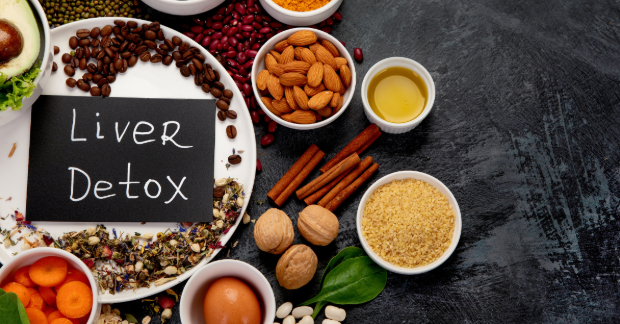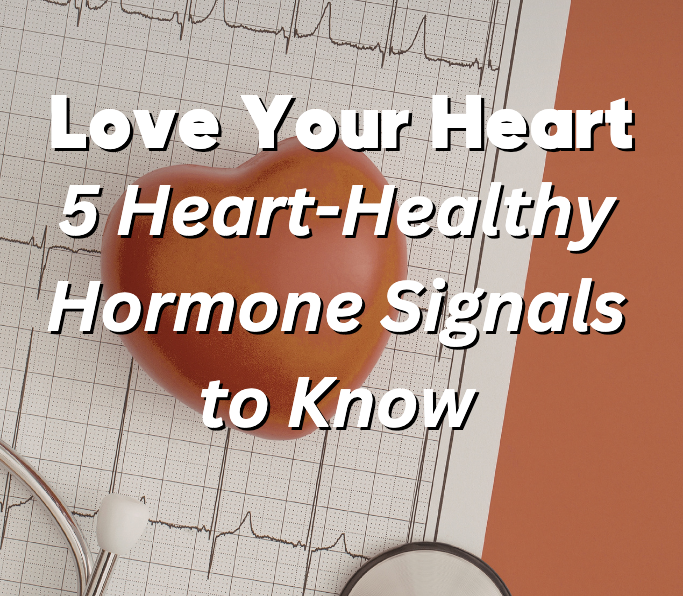How Does A Holistic Detox Balance Hormones?
When most people think of hormones, they immediately think of estrogen, testosterone, or thyroid. But here’s the truth I see every single day in practice: if your liver isn’t functioning optimally, your hormones won’t either.
The liver is one of the body’s most underappreciated multitaskers. Beyond filtering environmental toxins, alcohol, and medications, it plays a central role in hormone metabolism and balance. When your liver becomes sluggish, overloaded, or inflamed, hormones can build up or become imbalanced, and that affects everything from energy and mood to metabolism, weight management, and sleep.
Supporting liver health is one of the simplest yet most powerful ways to keep your hormonal system running smoothly. Yet, many people overlook liver support in their wellness routine, focusing solely on diet, exercise, or supplementation. The reality is that the liver acts as a central hub for almost all hormones in the body, so neglecting it undermines even the most carefully planned health interventions.
The Science Behind Hormone Detoxification
Your liver performs two main detoxification phases that are essential for hormone balance:
- Phase I Detoxification: The liver converts fat-soluble hormones and toxins into intermediate forms through oxidation and reduction reactions. This step is like the first filter in a complex wastewater system: toxins and old hormones are partially processed but not yet ready for elimination. Without proper Phase I function, harmful metabolites can accumulate, potentially contributing to oxidative stress and inflammation.
- Phase II Detoxification: These intermediates are then made water-soluble through methylation, sulfation, and glucuronidation, allowing them to be safely excreted through bile or urine (Zhao et al., 2021). Phase II detoxification is crucial because it completes the process of hormone clearance. If Phase II is sluggish, partially processed hormones recirculate in the bloodstream, disrupting normal hormonal communication.
If either phase is sluggish, hormones such as estrogen, cortisol, and thyroid can accumulate or convert into less favorable metabolites. For example, when estrogen isn’t cleared efficiently, estrogen dominance may occur, leading to symptoms like bloating, breast tenderness, fatigue, and irregular cycles. Women may experience intensified PMS, worsening menopausal symptoms, or stubborn weight gain. Men may also notice lower testosterone or mood changes when liver detox pathways are compromised.
📘 For a deeper dive into how estrogen and detox pathways work together, see Chapter 3 of Hormone Havoc.

Why Liver Health Impacts Hormone Function
Patients often ask me, “Why do I feel worse even though my lab work looks normal?”
The answer frequently lies in liver function.
Bloodwork often measures circulating hormones, not how well your body processes or eliminates them. When the liver’s detox pathways are congested, “used-up” hormones remain in circulation, disrupting the natural rhythm of hormonal communication.
This imbalance can manifest as:
- Persistent fatigue, even after sufficient sleep
- Weight gain (especially around the midsection or abdomen)
- Brain fog or mood swings
- PMS or heavy cycles in women
- Difficulty sleeping, including night wakings
Supporting your liver’s detox capacity helps your body process and clear hormones efficiently, so your lab numbers match how you feel. In other words, the liver ensures that hormones aren’t just produced but are also properly metabolized, eliminated, and recycled in a way that keeps your endocrine system in balance.
Liver health also affects adrenal hormone metabolism. For example, cortisol is metabolized by the liver, and impaired detoxification can lead to elevated nighttime cortisol or disrupted HPA axis signaling. Over time, this contributes to fatigue, sleep disturbances, and metabolic stress.
Everyday Habits That Support Hormone Detox
You can’t “out-supplement” a stressed-out liver; foundational support comes first. Implementing consistent lifestyle habits can dramatically improve Phase I and Phase II detox efficiency, supporting hormone balance from the inside out.
1. Focus on Detox-Friendly Foods
Cruciferous vegetables, such as broccoli, kale, cauliflower, and Brussels sprouts, contain compounds that help the liver process estrogen and other hormones. These foods stimulate liver enzymes involved in both Phase I and Phase II detoxification, improving clearance of estrogen metabolites and reducing estrogen dominance.
Add fiber-rich foods to support healthy bowel elimination, which prevents reabsorption of toxins and metabolites (Koeth et al., 2013). Fiber also binds excess estrogen in the digestive tract, promoting its excretion and reducing the risk of hormonal imbalances. Include foods like chia seeds, flaxseeds, legumes, and whole grains to enhance liver support and optimize hormone clearance.
2. Stay Hydrated and Limit Toxins
Water is essential for flushing waste through both the kidneys and liver. Adequate hydration supports bile production, which is critical for clearing fat-soluble hormones and fat-soluble toxins. Aim for at least 2–3 liters per day, adjusting for activity level, climate, and individual needs.
Limit alcohol, processed foods, and environmental toxins found in plastics, cleaning products, and cosmetics. Many personal care products contain endocrine-disrupting chemicals (EDCs) that mimic estrogen and interfere with hormone signaling. Switching to safer alternatives—glass containers, fragrance-free products, and natural cleaning agents—can reduce your chemical load significantly.
3. Move, Sleep, and Breathe
Exercise boosts circulation and lymphatic flow, both critical for detoxification. Movement stimulates the liver’s processing capacity by enhancing blood flow and supporting nutrient delivery. Both strength training and gentle cardio support liver health, hormone balance, and overall metabolism.
Quality sleep allows the liver to regenerate (Michalopoulos, 2017). Deep sleep is essential for optimal Phase II detoxification, including methylation, sulfation, and glucuronidation reactions. Poor sleep not only impacts liver metabolism but also disrupts the HPA axis and adrenal function, contributing to hormonal imbalance.
Deep breathing supports oxygen exchange and relaxation, helping your body stay in a parasympathetic (healing) state. Techniques such as diaphragmatic breathing, meditation, or guided relaxation reduce cortisol, allowing the liver to focus on its detox and regenerative functions rather than responding to chronic stress.
4. Consider Targeted Nutraceuticals
For many of my patients, we incorporate nutraceuticals such as N-acetylcysteine (NAC), glutathione, and milk thistle, all known to enhance liver detoxification pathways. These supplements support antioxidant capacity, liver enzyme function, and hormone clearance.
We select these supplements carefully as part of a personalized, integrative plan. Not everyone requires the same combination or dosage, which is why working with a healthcare professional is key. Targeted nutraceutical support can complement lifestyle interventions, accelerating liver and hormone recovery without overwhelming the body with unnecessary interventions.
How EVEXIAS Supports Hormone Detox
At EVEXIAS, we take a root-cause approach to hormone balance. That means looking beyond lab results to understand how your detoxification systems are performing. Lab numbers are only one piece of the puzzle; real-world symptoms, lifestyle factors, and environmental exposures complete the picture.
Through the EvexiPEL Method, we support optimal hormone balance using bioidentical hormone therapy, nutrition, and targeted supplementation while helping your liver function at its best. When your liver is supported, your hormones can do their jobs as designed, helping you stay sharp, lean, energized, and balanced throughout the day.
Patients often notice improvements in:
- Energy levels and mental clarity
- Weight management, especially around the midsection
- Sleep quality and consistency
- Mood regulation and reduced irritability
- Menstrual regularity and menopause symptom management
Integrating precision medicine with lifestyle interventions amplifies results. For example, combining liver-supportive foods, exercise, stress reduction, and HRT can normalize hormone signaling more efficiently than any single intervention alone. This holistic approach addresses root causes rather than masking symptoms.
Give Your Liver Some Love
Your hormones can only thrive if your liver does. When you lighten your toxic load and nourish this powerhouse organ, you set the stage for better energy, metabolism, and clarity.
Healing doesn’t happen by accident; it happens by design. Implementing consistent, liver-supportive habits allows your body to process hormones efficiently, reduce inflammation, and maintain long-term balance. Whether it’s correcting estrogen dominance, supporting adrenal function, or optimizing thyroid metabolism, liver health is the foundation of hormone wellness.
If you’re ready to uncover what your body has been missing, EVEXIAS can help you map out the next steps toward balance and renewal. By combining integrative lifestyle interventions with advanced hormone therapy and targeted supplementation, you can achieve a level of energy, mental clarity, and metabolic health that supports your life goals.






